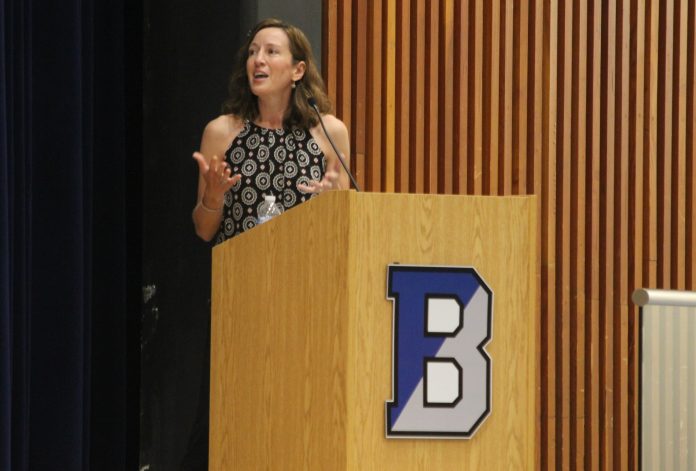Students at Bensalem High School may soon be able to enjoy a few extra “z’s” in the morning before catching the bus for first period.
Currently, the Bensalem School District is researching the topic of whether or not more sleep and a later start time – something recently implemented by Phoenixville, Radnor and Union-Chadds Ford — will positively impact teens’ mental and physical health, learning abilities and overall success in life.
In order to kickstart a community conversation regarding the potential change in schedule, parents, students and staff were invited to an information session on the evening of Wednesday, Oct. 2, in the high school auditorium.
On hand to present scientific evidence and address concerns was Dr. Jacqueline Kloss, a clinical psychologist of behavioral sleep medicine at Bryn Mawr Psychological Associates.
According to Kloss, adolescent sleep deprivation is a national epidemic, with 73 percent of high schoolers not meeting the recommended eight hours of sleep. Because of a changing circadian rhythm that happens at the time of puberty, the secretion of melatonin (the hormone that enables us to sleep at night) is delayed approximately two hours in teens.
Basically, Kloss said they’re physically unable to fall asleep before 11 p.m. For most teens who need to wake up by 6 a.m. for school, it’s impossible to get those eight hours of rest.
“This is a biologically-driven issue that starts in puberty,” she said. “Adolescents are chronically sleep-deprived at a time when sleep is critical for their developing brains. Waking up a teen at 6 a.m. is like waking us up at 4 a.m. That’s what it feels like biologically to them.”
Kloss stated some adverse effects of sleep deprivation, including increased depression and anxiety, decreased emotional regulation, links to increased obesity, increased substance use, increased motor vehicle crashes, and poor academic performance due to memory and problem solving difficulties.
On June 16, 2016, the American Medical Association issued a press release that stated a new AMA policy encourages middle and high schools to start no earlier than 8:30 a.m. This would allow teens to achieve the requisite eight hours of sleep per night, align their sleep with their own circadian rhythm, and reach REM sleep – the deep state of unconsciousness that’s associated with cognitive health, which Kloss said they typically hit during early morning hours…until their 6 a.m. alarm forcibly interrupts it.
The keynote address included Kloss’ counterarguments to concerns Bensalem parents will naturally have. For example, a popular belief is that if teens simply turn off their electronic devices, they’ll fall asleep sooner. Kloss stressed that because of the delayed secretion of melatonin, biology will still prevent them from dozing off until at least 11 p.m.
She also touched on the issue of extracurriculars and homework. Would these will be pushed to the backburner if teens are getting out of school an hour later?
“They have the same amount of demands, but they tend to be more efficient at them,” Kloss said.
The presentation concluded with a list of positive outcomes of a later start time, including fewer motor vehicle crashes, less daytime sleepiness, fewer depressive symptoms and fewer athletic injuries. Kloss added that a shifted schedule isn’t the only resolution to the problem of teen slumber. Other strategies include actively working to address mental health issues, monitoring their workload, keeping a regular sleep schedule on the weekends and limiting caffeinated beverages.
Attendees were then invited to ask questions to a panel of appointed members of the Pennsylvania Joint State Government Commission Advisory Committee on Secondary School Start Times, which included Kloss; Dr. Gail Karafin, Bensalem Township School District psychologist; Dr. Michael Petitti, direct of communications for Radnor Township School District; Dr. Craig Parkinson, principal of Phoenixville Area High School; and Dr. Mark Hoffman, executive director of the Bucks County Intermediate Unit.
One mother, whose son is a freshman, said he doesn’t mind getting up early. In fact, he prefers it. However, she suggested the district cut back on the late hours of extracurricular activities. Several nights a week, her teen is at band practice until 10 p.m., and still has homework to complete once home. Petitti said Radnor implemented a cap on extracurricular times.
“If we’re holding practices until 10 p.m., what does that say to parents about our commitment to try to get our kids more sleep?” he asked.
Another mother of a freshman football player asked how afterschool games would work if the rest of the league is on a regular schedule. Petitti admitted this has been a speed bump, but Radnor is communicating with the other schools to work out a compromise.
Bensalem school board members Marc Cohen and Stephanie Ferrandez both questioned the potential cost of this initiative, especially in regard to transportation. While Parkinson said Phoenixville had no associated costs, Petitti said Radnor hired two additional bus drivers.
Bensalem School District is in the process of forming a Sleep and School Start Time Advisory Committee, which is open to all community members. Those interested should apply online at bensalemsd.org by clicking “Sleep and School Start Times” under the “Community” tab. Deadline to apply is Oct. 25. The committee’s first meeting will take place on Nov. 12 at 7 p.m. in the boardroom of the Dorothy D. Call Administrative Center, 3000 Donallen Drive, Bensalem. ••
Samantha Bambino can be reached at [email protected]


